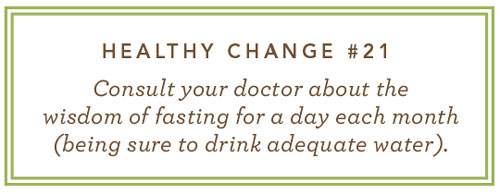Fasting
The quick answer: Though we eat to live, fasting can improve our health as well as the quality of of our lives.
_____________________________________________________________________________________________
Scripture
Of the three oracles that inform this blog, one is Scripture. The other two are Science, and Tradition. I like the idea of teaming Scripture—discredited in many a laboratory—with Science to create a more profound answer. That said, we’d like to discuss a religious practice common to many faiths: fasting.
In the Mormon faith, fasting is done monthly. Typically this means skipping two meals (the money saved is given to a special fund for the poor). This is done for spiritual, rather than health, reasons but fasting does have health benefits.
N. Y. Times
The N. Y. Times ran an article last year, “Regular Fasting May Boost Heart Health.” The article cited a study that found regular fasting among Mormons was associated with a 58% reduction in heart disease. Other lifestyle factors may contribute, but no medicine, to my knowledge, yields such a benefit.
The same doctors then took blood samples from people undergoing a 24-hour fast. Among other benefits, there was a surge of human growth hormone after fasting—a 20-fold increase for men, 13 times for women. Human growth hormone is released during starvation to promote burning of fat and protect muscle and other lean tissue. Want to reduce your fat level? Ask your doctor of fasting is right for you. Because excess fat is such a problem in our society, I’m surprised this benefit isn’t more discussed.
A recent study by the National Institute on Aging found that weekly fasting protected the brain from the effects of Alzheimer’s, Parkinson’s and other diseases. The study suggested two days of minimal calories each week, followed by five days of normal eating. However you do it, there seems to be a benefit to fasting.
Dr. Joel Fuhrman
Dr. Fuhrman writes regularly on nutrition and preventative health. Fasting is recommended in his book, Fasting and Eating for Health: A Medical Doctor’s Program for Conquering Disease. I discussed his book in this post. Dr. Fuhrman recommends that your doctor supervise fasts longer than three days, you should know. Fuhrman found so many health benefits to fasting that I decided to try a three day fast. Here is what I learned:
- Much of my eating, mainly snacking, is driven by boredom rather than hunger. If you want to improve your health, replace snacking with . . ., well, a moment of jump-roping or a Sudoku puzzle.
- After the first day, I wasn’t really hungry. Hunger diminishes as the fast progresses.
- Your mental focus improves during fasting—as the physical appetites diminish, you get a better view of what’s important. Fuhrman notes that people giving up addictions, including smoking, do better if they fast.

Please comment: Share your experience with fasting.

 Monday, May 5, 2014 at 1:50PM
Monday, May 5, 2014 at 1:50PM
Reader Comments (3)
Scripture
Of the three oracles that inform this blog, one is Scripture. The other two are Science, and Tradition. I like the idea of teaming Scripture—discredited in many a laboratory—with Science to create a more profound answer. That said, we’d like to discuss a religious practice common to many faiths: fasting.
In the Mormon faith, fasting is done monthly. Typically this means skipping two meals (the money saved is given to a special fund for the poor). This is done for spiritual, rather than health, reasons but fasting does have health benefits.
Scripture
Of the three oracles that inform this blog, one is Scripture. The other two are Science, and Tradition. I like the idea of teaming Scripture—discredited in many a laboratory—with Science to create a more profound answer. That said, we’d like to discuss a religious practice common to many faiths: fasting.
In the Mormon faith, fasting is done monthly. Typically this means skipping two meals (the money saved is given to a special fund for the poor). This is done for spiritual, rather than health, reasons but fasting does have health benefits.
Scripture
Of the three oracles that inform this blog, one is Scripture. The other two are Science, and Tradition. I like the idea of teaming Scripture—discredited in many a laboratory—with Science to create a more profound answer. That said, we’d like to discuss a religious practice common to many faiths: fasting.
In the Mormon faith, fasting is done monthly. Typically this means skipping two meals (the money saved is given to a special fund for the poor). This is done for spiritual, rather than health, reasons but fasting does have health benefits.